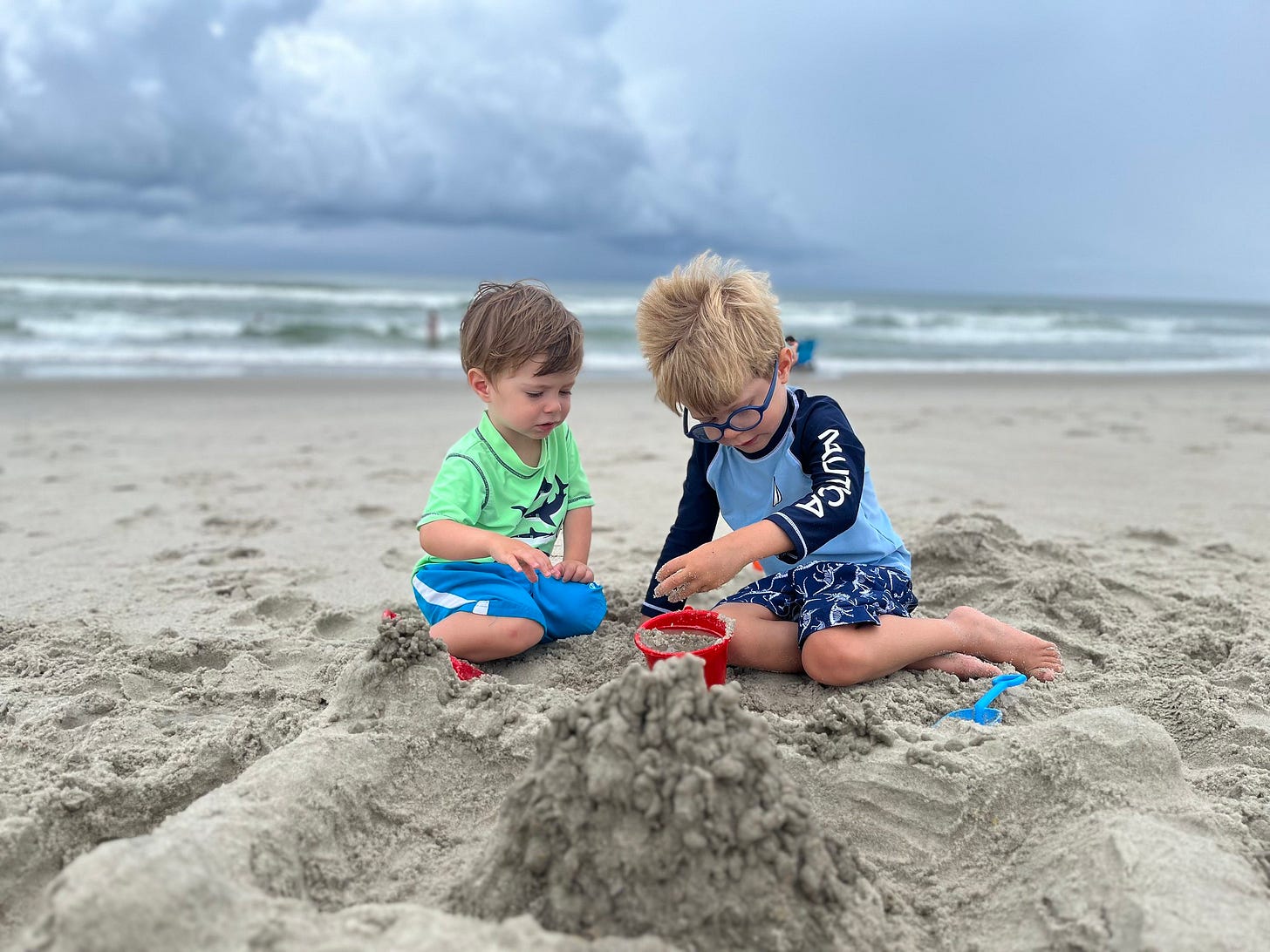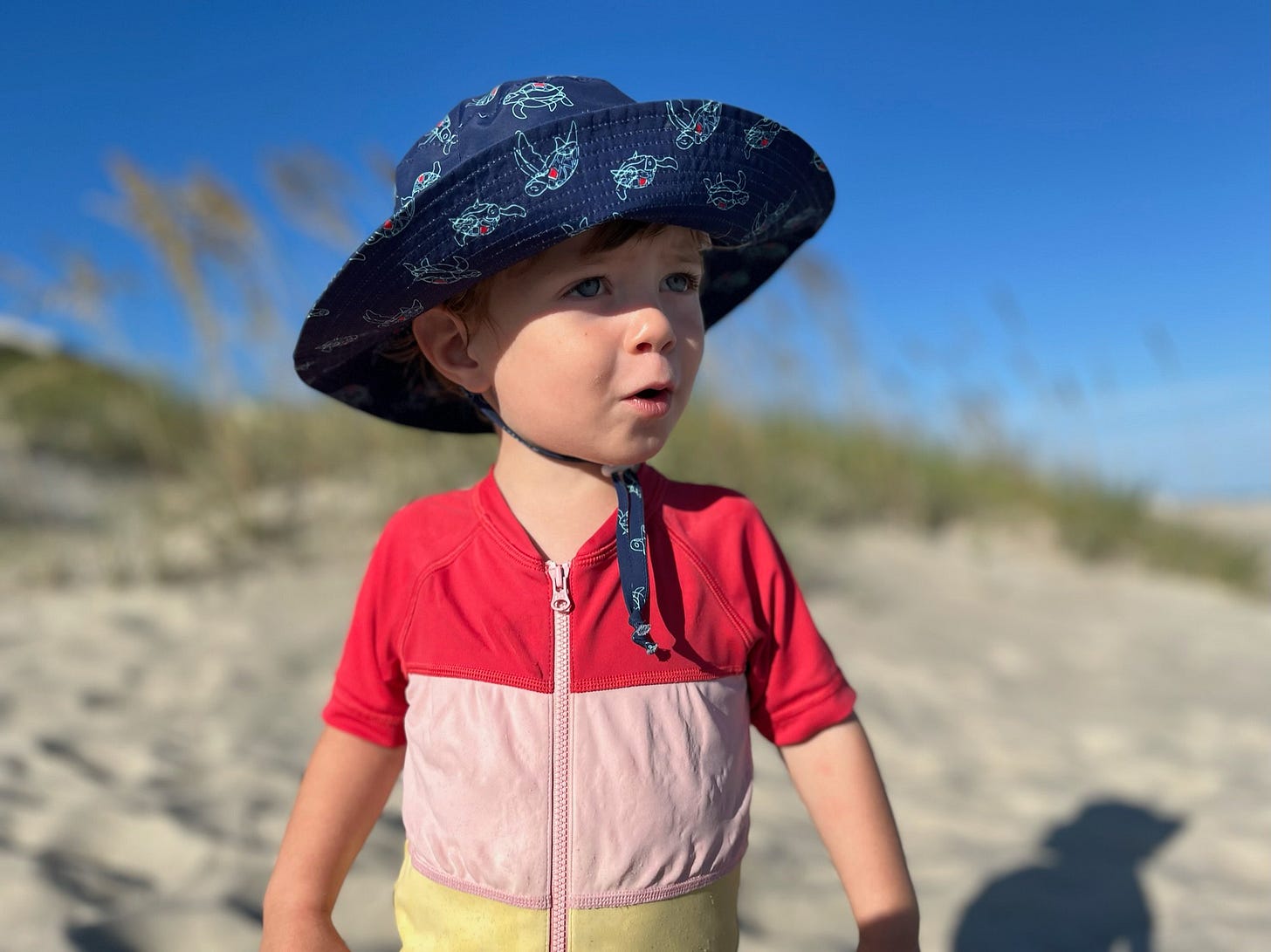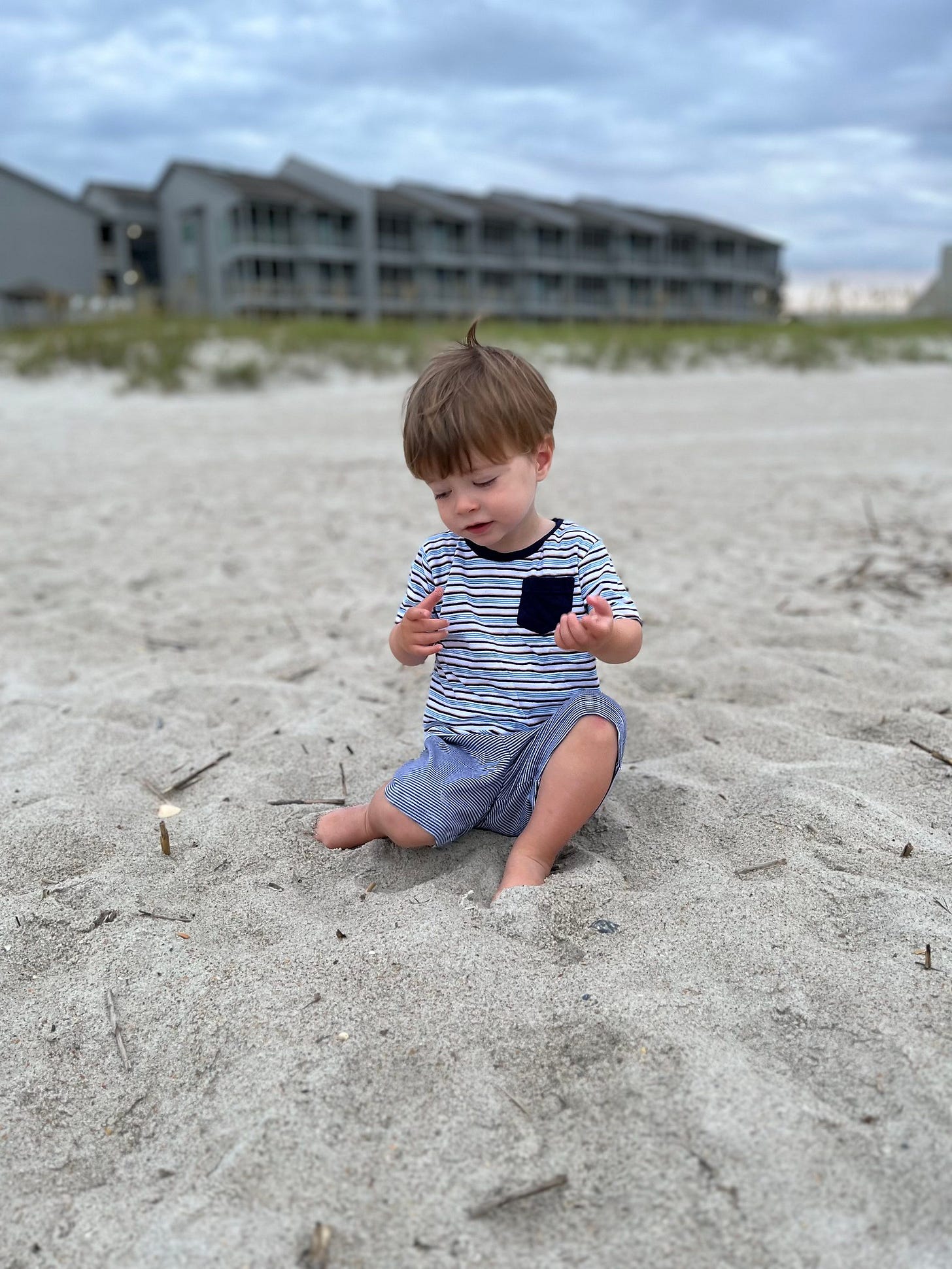We had a lovely time at Atlantic Beach with Guion’s family and celebrated Felix’s second birthday while there.
Felix continues to be our joyful, wild little dude, independent and yet always desperate for Moses’s attention and recognition.
His current loves include: throwing heavy objects, watermelon, picking and eating blackberries in the garden, trucks, hurtling his body down the “indoor slide” (Nugget ramp; best money we’ve ever spent on child equipment), running laps in the house, reading (to my surprise), and fetching objects like a dog.

Felix is also taking the whole two-year-old thing seriously, as he’s suddenly become quite whiny and moody.
To combat this, we’ve learned that giving him lots of jobs to do—put this laundry in that basket, drop your diaper in the bag, get plates for dinner, start the dryer—mitigates the whining, so we’re loading him up with chores.
We’ve been thinking about this a lot lately: the vital importance of giving kids—especially little kids—independence and agency.
Fearful parents, fearful kids
Today, parents are culturally encouraged to:
never leave our children alone,
entertain them constantly,
never give them useful work,
and protect them from any hard things.
I believe that all of this is backward and anti-human-flourishing, and yet I can find it hard to put into practice.
It’s hard because all of these parenting trends have their roots in fear. And fear is something I have! Fear-based parenting is so common among my millennial ilk, even though our children are safer than children have ever been, perhaps in human history. Why are we so afraid? Modern life. The all-seeing, all-knowing computers in our pockets. Lack of movement and connection. Loss of ritual and tradition. A pandemic that did a real number on us. No true threats so we make small things in to threats.
Protecting our children—physically, emotionally, psychologically, socially—has always been a human priority, but our good, evolutionary instinct has been warped by 21st-century life. We don’t know how to assess true risk. We protect them from things that aren’t dangerous (e.g., walking to the park alone) and give them total freedom with things that are dangerous (e.g., social media).
Pro child labor
So what does this have to do with chores?
Work is what I have been thinking about lately, given the aforementioned whiny toddler (although I will probably hold forth on those other trends at a later date).
It is much easier to do those chores myself than to ask Felix or Moses to do them. But I continue to believe that they NEED to have useful, challenging work on a regular basis if they’re going to be stable adults. They need to fail. They need to be frustrated. They need to experience the joy and confidence that comes from solving a problem on their own, without adult assistance. They need to be given tasks according to their age and maturity, responsibilities that push them to desire even greater responsibility.
I asked Moses yesterday morning what kind of job he wanted when he grew up. I thought he was going to say something like “robot” or “superhero,” but he said: “Mommy, when I grow up, I want to do the dishes with you. I want to help you wash them and put them away.”
My housekeeping-focused heart swelled, of course, but it made me realize that he takes his housework very seriously. It’s a job to him, and that’s exactly how I want him to continue thinking about it. He’s already eagerly anticipating his next big responsibility at home.
Even still, he whines a little when he has to put away the silverware every morning, but we keep saying to him, “Everyone in this family has a job to do. You’re part of the family, so you have a job to do too.” Maybe, just maybe, it’s starting to get through to him.
A writer I discovered recently speaks wisely of the importance of giving children useful work. Simon Sarris is a dad and developer living a halcyon life in New England, and he wrote about this phenomenon of children being stripped of agency (and how it’s connected to the uselessness of the modern education system):
“We seem to have a political (public) imagination so shallow that it cannot conceive of what to even do with children, especially smart children. We fail to properly respect them all the way through adolescence, so we have engineered them to be useless in the interim. We do not need children to work, that is abundantly clear, but by ensuring there is nothing for them to do we are also sure to destroy more onramps towards making meaningful contributions to the world.
“Much of the fault for this lies in an attempt at systematizing skill and knowledge transfer so thoroughly that people begin to conceive of it as the task of school, rather than a normal consequence of work. Because of this shift, childhood contains the age where one can intuit very well how the world works while being prevented from acting upon it meaningfully. Instead of an adolescence full of rites of passage, where one attempts to master something and accept responsibility, we have made it full of waiting, and doing work—for school is work—that nearly everyone knows is fake.”
Sarris goes on to say:
“This is not worship of employment, but a simpler observation: It seems that the more you ask of people, and the more you have them do, the more they are able to later do on their own.”
I’m going to write this in huge letters on the fridge, to remind myself every day that it’s worth the time and tedium to teach my little kids how to work.
Pay up front
“Pay up front” is one of my wise mother’s child-rearing mantras. I’ve probably written about it before, because I think about it a lot now.
By this phrase she means: Invest in the discipline and training of your children now, while they are young. It will be harder and more time-consuming. You will be more exhausted. But this is the time—when they are toddlers—to shape their characters for the rest of their lives. If you wait to give them hard work for the first time until they’re 14, you’ve waited way too long. By that point, you’ll have a teen who is psychically bored, spiritually rootless, and devoid of personal agency or independence.
For decades, this was my mom’s animating principle of motherhood. Do the hard work now. Don’t put it off till later. It was harder for her, for sure. But the rules were clear: We were part of the family, and we had jobs to do. We weren’t allowed to eat breakfast until we’d finished our household work. The odd joy of it was that this ritual of work made us desire more and more of it. I wanted to mow the lawn by myself when I was 10, and so I did. Kelsey and I wanted to learn how to pay utility bills by checkbook (?? why) when we were 11 and 9, and so we did. We were so eager to be useful. We were proud of what we contributed to the family, as small as it was, and I want my sons to experience this same rush—even as tiring as it is to me to teach them how to properly fold laundry and clean windows.
Additional reading
“The Most Precious Resource Is Agency,” Simon Sarris
Simplicity Parenting, Kim John Payne







Yes and amen - I took so much encouragement from this to keep on pressing into giving my boys "work" around the house. Thank you for writing it!